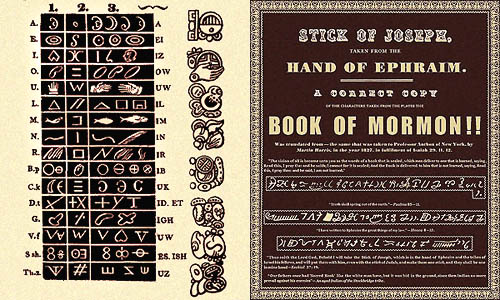The Disillusioned Latter-day Saint
This is an excellent piece of work by Richard Bushman which I ran across from the NOM board. According to the blogger LifeOnaPlate, this is an introduction by Bushman to the 2008 summer seminar "Joseph Smith and His Critics" given July 29, 2008. He does an excellent job of describing almost step by step exactly what goes on in the mind of the disillusioned Mormon.
Here is the link to the blogger's post
Here are the highlights:
Increasingly teachers and church leaders at all levels are approached by Latter-day Saints who have lost confidence in Joseph Smith and the basic miraculous events of church history. They doubt the First Vision, the Book of Mormon, many of Joseph’s revelations, and much besides. They fall into doubt after going on the Internet and finding shocking information about Joseph Smith based on documents and facts they had never heard before. A surprising number had not known about Joseph Smith’s plural wives. They are set back by differences in the various accounts of the First Vision. They find that Egyptologists do not translate the Abraham manuscripts the way Joseph Smith did, making it appear that the Book of Abraham was a fabrication. When they come across this information in a critical book or read it on one of the innumerable critical Internet sites, they feel as if they had been introduced to a Joseph Smith and a Church history they had never known before. They undergo an experience like viewing the famous picture of a beautiful woman who in a blink of an eye turns into an old hag. Everything changes. What are they to believe?
Often church leaders, parents, and friends, do not understand the force of this alternate view. Not knowing how to respond, they react defensively. They are inclined to dismiss all the evidence as anti-Mormon or of the devil. Stop reading these things if they upset you so much, the inquirer is told. Or go back to the familiar formula: scriptures, prayer, church attendance.
The troubled person may have been doing all of these things sincerely, perhaps even desperately. He or she feels the world is falling apart. Everything these inquirers put their trust in starts to crumble. They want guidance more than ever in their lives, but they don’t seem to get it. The facts that have been presented to them challenge almost everything they believe. People affected in this way may indeed stop praying; they don’t trust the old methods because they feel betrayed by the old system. Frequently they are furious. On their missions they fervently taught people about Joseph Smith without knowing any of these negative facts. Were they taken advantage of? Was the Church trying to fool them for its own purposes?
These are deeply disturbing questions. They shake up everything. Should I stay in the Church? Should I tell my family? Should I just shut up and try to get along? Who can help me?
At this point, these questioners go off in various directions. Some give up on the Church entirely. They find another religion or, more likely these days, abandon religion altogether. Without their familiar Mormon God, they are not sure there is any God at all. They become atheist or agnostic. Some feel the restrictions they grew up with no longer apply. The strength has been drained out of tithing, the Word of Wisdom, and chastity. They partly welcome the new freedom of their agnostic condition. Now they can do anything they please without fear of breaking the old Mormon rules. The results may not be happy for them or their families.
Others piece together a morality and a spiritual attitude that stops them from declining morally, but they are not in an easy place. When they go to church, , they are not comfortable. Sunday School classes and Sacrament meeting talks about Joseph Smith and the early church no longer ring true. How can these people believe these “fairy tales,” the inquirers ask. Those who have absorbed doses of negative material live in two minds: their old church mind which now seems naive and credulous, and their new enlightened mind with its forbidden knowledge learned on the internet and from critical books.
He goes on to talk about how to deal with disillusioned members. I admire his approach. He goes out of his way to talk about how the standard "read the scriptures and pray about it" will not work. His idea is that if people are presented the facts in a controlled setting it wouldn't look quite so bad. Although I agree with him in many ways, I think that for some people there is not much that can be done. It has nothing to do with lack of fellowshipping, I simply can no longer believe in the doctrine.
It is quite frustrating when you try to explain why you no longer believe and they come back with the idea that there must be something wrong with you. It can't be the doctrine, because that is perfect, so it must be that you lack faith or are spiritually lazy and can't cut it.
I think Bushman is doing a good job at trying to build bridges between true believing members of the church and "apostates". It has been my experience that when people understand why someone no longer believes in the church, they become more tolerant.
Disillusioned Mormon Read more!








